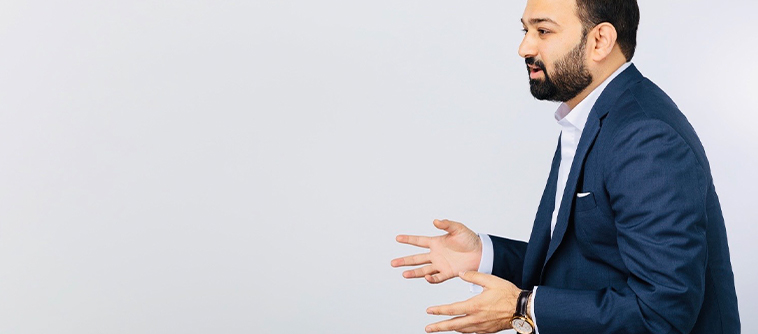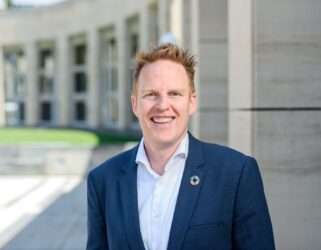
In early 2020, Rathan Kinhal was on a bus in Geneva on his way to his first day in a new job at the International Committee of the Red Cross (ICRC) when texts started pinging into his phone.
“It was some of my friends letting me know that we had gone into lockdown,” he says. “I was ready for work and even had a tie rolled up in my pocket for when I arrived at the office.”
For the next many months, like millions around the world, he worked from home as the COVID-19 pandemic spread, checking in weekly with his new boss at the ICRC. His new role was that of adviser in operations business support at the organization, which provides humanitarian protection for victims of armed conflict and other situations of violence.
The move to the ICRC came after eight years at The Global Fund, a worldwide movement to defeat HIV, tuberculosis and malaria. There, among other responsibilities, he led its digital platform portfolio for collaboration in public health with external partners such as USAID, The Gates Foundation, and the World Health Organization.
Fast forward to today, and Kinhal has come a long way at the ICRC since that day on the bus interrupted the start of his career at the organization. After various roles in transformation and strategy, he is now leading a project to redefine ICRC strategy for the period 2025-29.
Managing in turbulent times
It is a task with special resonance, not just because this year is the 160th anniversary of the creation of the ICRC. As Kinhal explains, the world faces a “polycrisis” – a 1970s term later popularized by historian Adam Tooze to describe the confluence of multiple crises.
“The parameters for designing the new strategy are massive,” Kinhal says. “It requires me to keep a close eye on surmounting challenges in areas of geographical crisis, rising inflation and public debt, record hunger, the climate crisis, and armed conflict, while working with senior leadership to develop a resilient strategy to address these challenges.”
Part of his confidence in being able to handle this challenge stems from the time he spent at IMD in 2017/18, when he completed an Executive MBA with a focus on managing in turbulent times.
In choosing where to study, Kinhal considered various institutions but picked IMD after learning that a leader he had long admired — Harsh Goenka, the chairman of Indian conglomerate RPG Group — had done his MBA there in the 1990s. “I actually met him in Mumbai, and I told him that his story had inspired me. He gave me his business card and I still treasure it as one of my ‘goose bump’ moments,” he remembers.
Kinhal says that while he didn’t know it at the time, the experience at IMD was “my audition for transformation at the ICRC”.
“There were already a lot of geopolitical tensions and emerging challenges –like the climate crisis. Coming out of IMD, the first thing you learn is to take on challenges head on; you don’t stand on the side.”
IMD helped to develop the leadership skills needed to navigate all this in relation to the not-for-profit sector. “Humanitarian work requires a combination of various things: diplomatic tact, strategic mindset, fact-based, swift decision making, being partnership-oriented, embracing digital agility, and having empathy,” Kinhal explains.
Three acquired skills in particular stand out. One is the “future-focused” blend of skills required to lead a business transformation during turbulent times. “The entire humanitarian sector is undergoing a rapid transformation, digital or otherwise, of its own, parallel to what is happening across the private sectors,” he explained. “IMD helped me in identifying these trends, and I tailored my own approach to finding solutions to the challenges I now face.”
A second relates to lessons he learned at IMD on digital transformation that he still finds useful years later. As organizations across the world transform digitally, knowledge of “platform strategy” has become critical in differentiating services to customers, and the same is true of the ICRC and how it interacts with its beneficiaries, Kinhal says.
Finally, there is how to lead a global transformation – this is highly relevant at the ICRC, which has key operations in Afghanistan, Ethiopia, Sudan, the Sahel region, Syria, Yemen, and Ukraine. “I learned about leading global transformations, and transforming customer experience, operational processes, and business models,” he said.
“It’s like being equipped with your own Swiss Army Knife, where you can use a specific tool to deal with the challenge at hand.”
Swiss military training
Given the ICRC’s remit dealing with humanitarian crises, one module at IMD was particularly memorable – and ultimately very useful. Kinhal and his IMD classmates were taken to a secret Swiss military training location and put through a simulated crisis, the details of which Kinhal is still not allowed to reveal.
The team was set a challenge, with the complexity of the challenge increasing every two hours. “If the team hasn’t solved the first challenge by the sixth hour, you had a real problem. And the most amazing thing is you had to solve this challenge with only a pen, paper, and a flipchart,” he recalled.
“You realize what you are made of during that process. You really develop those senses in your body where you are tested to the max – and you don’t lose your energy.”


